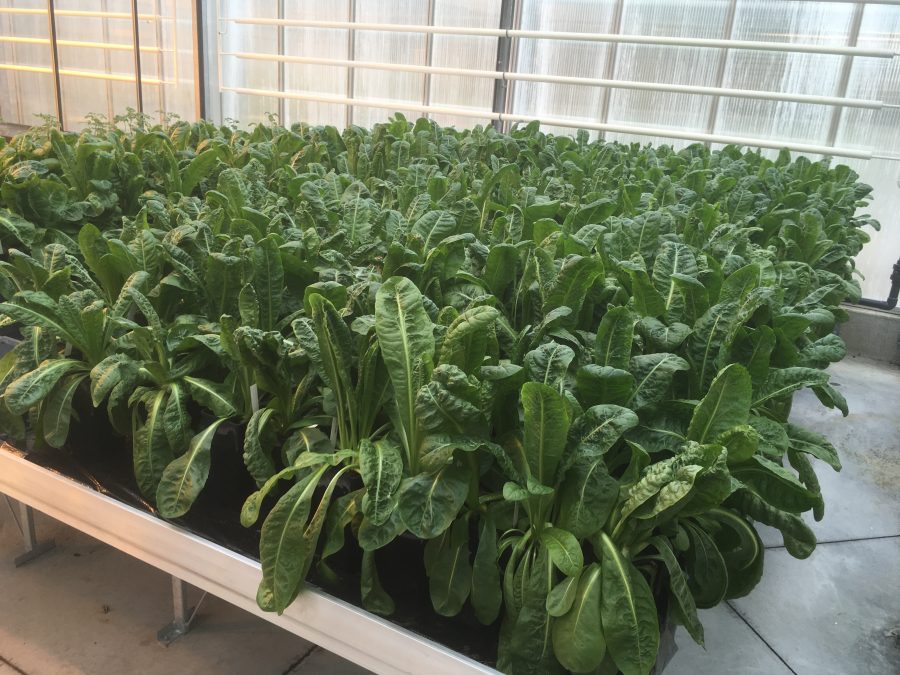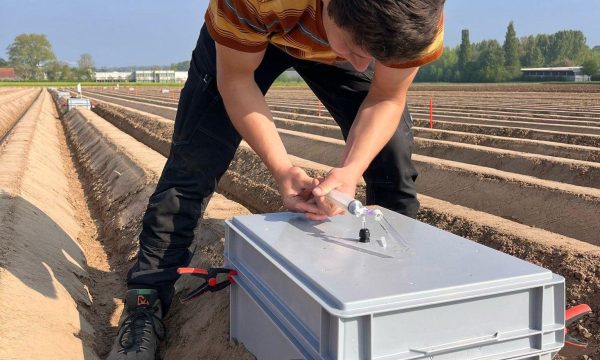Press release Less bitter Belgian endive and chicory by switching off the "bitter genes" using CRISPR/Cas9 technology.
Researchers have succeeded in creating chicory and Belgian endives that contain hardly any bitter substances. They did this by using the famous CRISPR/Cas9 technology to switch off only those genes that control the production of bitter substances in the plants. This offers opportunities for Belgian endive cultivation, because less bitter endives are more appreciated by (younger) consumers. It is also interesting for chicory cultivation, because less bitter roots are better suited for the production of healthy, fiber-rich and gluten-free flours for the food industry. Even for the breeding of other well-known bitter vegetables such as Brussels sprouts and Belgian endive, this research opens new possibilities.

'Crown jewel' Belgian endive sinks in popularity among young people
Less and less Belgian endive and chicory is being grown in Belgium. Yet there is still potential in these crops, especially if we can make them less bitter. Fresh Belgian endive, one of Belgium's 'crown jewels', is still in our top 10 most eaten vegetables (VLAM). But a more varied supply in terms of bitterness, would better meet changing demand. Young consumers, in particular, want a vegetable that tastes just a little less bitter.
Demand for dietary fiber for healthier food products
Chicory is less well known to consumers but is processed into inulin - a healthy soluble prebiotic dietary fiber - for our food industry. That industry is also interested in less bitter raw materials. Bitterness-free chicory roots could be processed into a fiber-rich flour immediately after drying and grinding, without first having to extract and purify the inulin.
'Bitter genes' found and turned off using CRISPR/Cas9
For Belgian endive and chicory producers in Belgium, it is therefore important that breeders focus on less bitter varieties. Charlotte De Bruyn, researcher at UGent/VIB and ILVO, started in her doctoral research by searching for the genes responsible for the bitter taste. She was assisted by VIB researcher Alain Goossens, an expert in the field of substances that influence taste, and ILVO researcher Katrijn Van Laere, an expert in classical and advanced breeding techniques.
The genes influencing bitterness are technically those involved in the biosynthesis of guaianolide sesquiterpene lactones. Charlotte De Bruyn succeeded in 'switching off' those genes very specifically with CRISPR/Cas9 in the crops. That is, the genes are still present in the plants but are no longer expressed. As a result, the gene-edited Cichorium plants hardly produced any bitter substances anymore.
Technique is remarkably fast and accurate
Katrijn Van Laere, doctoral co-promotor, points out the great potential of this technique: "CRISPR/Cas9 is a 'new' technique that can be used in breeding and appears to be very successful in making only desired changes to the DNA of plants. This allows you to do very targeted and decisive breeding. In barely a year's time we were able to switch off the production of the bitter substance genes and create plants that can now be further evaluated for other agricultural aspects. What is possible through classical breeding is unclear, but in any case you quickly end up with a number of cycles of crossing and selection work to end up with plants in which the production of bitter substances is probably reduced, but never completely eliminated."
Successful biotechnological study
With this research, Charlotte De Bruyn is taking an important step. "A number of specific genes were found that, when switched off in chicory, still hardly produce any bitter substances. Furthermore, a CRISPR/Cas9 protocol was optimized to switch off as many of these genes as possible at once, which is still one of the bigger challenges today. Of course, there is still room for optimization in further research."
When will we see the result on our plate?
It will be some time before we can buy the less bitter Belgian endive. First, further research needs to be done to identify additional functions of the identified genes and the developed product lines need to be further expanded. On top of that, there is the decision of the European Court of Justice in 2018 that CRISPR/Cas9 modified plants fall under the same strict legislation as genetically modified organisms (GMOs). This makes it almost impossible to market them in practice in Europe.
New perspectives for other 'bitter' veggies
Nevertheless, Charlotte De Bruyn's research is an important step forward for science. It also offers perspective for the breeding of other crops such as Brussels sprouts, endive and rocket.
Promotor Katrijn Van Laere: "Identifying and characterizing the biosynthesis genes is a very big step in understanding how plants create bitter substances. With this fundamental knowledge we can now screen large existing populations of plants for natural mutants with the same effect. Because unlike CRISPR/Cas9 modified plants, natural 'mutants' are not covered by GMO legislation."
ILVO wants to continue to work with companies on the CRISPR/Cas9 breeding technique for development of new cultivars in Belgian endive and chicory, among others. UGent/VIB is also a logical partner in this, as the Department of Plant Systems Biology has a lot of experience and interest in gene discovery in plant terpene metabolism, metabolic engineering and the development and application of CRISPR/Cas9 based technology.
"Charlotte's research provides unique insights into the mechanisms by which plants produce bitter substances. This fundamental knowledge creates numerous new opportunities to adapt the bitterness of crops such as chicory and chicory to users' requirements," concludes VIB PhD supervisor Alain Goossens.
Charlotte De Bruyn defended her doctoral research ” Unravelling of the sesquiterpene lactone biosynthetic pathway in Cichorium intybus using CRISPR/Cas9 genome editing” on 28 January 2022. Promotors were Dr. Ir. Katrijn Van Laere of ILVO and Prof. Dr. Alain Goossens of VIB.



